Abstract: In the context of global ecological degradation, scholars and practitioners have increasingly emphasized the interconnectedness of education and ecology, with particular attention given to the concept of ecological literacy. Over the past decades, numerous definitions, approaches, and conceptual frameworks have emerged for ecological literacy, each associating it with various meanings and methods. This broad scope is a significant characteristic of ecological literacy as it underscores its interdisciplinary nature. However, for stakeholders in the field of ecological literacy as well as related domains such as environmental education and sustainability education, this plurality of meanings has become problematic because it creates confusion and makes the concept difficult to work with. This article assesses the concept of ecological literacy to enhance the general understanding among researchers and practitioners. It is structured into four main sections: definition of the concept, early articulations, frameworks, and empirical research. Finally, the article concludes with a discussion on the implications of these findings for environmental educators.
Continue Reading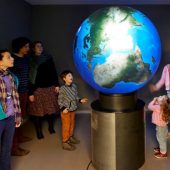
Abstract: This paper reports part of a larger study on the development of systems thinking skills in German 7th grade comprehensive school students regarding the climate. Research has shown a fragmented understanding of climate change among students that hardly accounts for the dynamic interrelations in the climate system and may pose a barrier in understanding adaptation and mitigation strategies (Shepardson et al., 2017, 2011, Calmbach 2016). While much is known the impact of short-term interventions on the general system understanding of students, what is lacking to date is 1) a specific intervention on climate system understanding and 2) insights into the process of developing system understanding in students. Helpful insights in this context come from Conceptual Development theories for they allow the development of systemic thinking to be viewed in terms of conceptual expansion or conceptual change. Starting from these desiderates, a teaching-learning sequence was developed based on the SYSDENE model of system competence (Frischknecht et al. 2008). In the sequence young learners systematically link experiences from formal science education with the experiences at three non-formal learning environments. A mixed-methods approach was used to explore the impact of this 3-month sequence on 19 7th grade students. A written pre-/post-test suggested a significant improvement in Climate System Reconstruction for the group (pre-test Median = 6.75 vs. post-test Median = 12.5, Wilcoxon Test: p = .003, r = .82). However, a qualitative analysis of classroom conversations, interviews and concept maps indicated that cognitive development toward a higher level of system thinking was neither continuous nor did every student reach it. Moreover, the SYSDENE model’s Competence Area “Describe System Model” proves critical. Being able to describe the main climate system factors is not sufficient, one also needs to be able to distinct weather from climate and grasp several scientific concepts related to the climate (e.g. greenhouse effect, water cycle, evaporation, reflection) in order to understand climate as a system.
Continue Reading
Abstract: The contribution first outlines the state of research on the relatively new Fridays for Future (FFF) movement and categorises first studies particularly from a German perspective, to provide a basis for a further differentiation in this field of research. In this context, fundamental aspects of the movement are presented. The self-concept of the German Fridays for Future movement in terms of a young protest movement with a global orientation is then compared against the educational tasks stipulated in the school legislation of the federal states (Bundesländer) with their societal-educational objectives. The contribution focuses on the question in how far the self-concept of the German branch of the FFF movement as an international protest movement and the activists’ engagement for climate protection and political participation is reflected in the educational objectives stipulated in school legislation. Statements are analysed regarding climate and environmental protection, participation and democracy and transnational references in the school legislation. A link can be found between the self-concept of the Fridays for Future movement and school legislation, but this does not resolve the conflict between the school strikes and compulsory schooling – a conflict that is intended by FFF to highlight the perceived urgency of the cause. Schools, educational administrators and educational policymakers are thereby urged to take a stance.
Continue Reading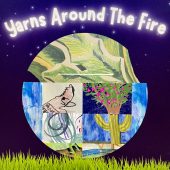
Abstract/Description: What happens when educators and professionals take a long-standing pedagogical activity, The Council of All Beings, and reshape the experience into a picture book? This paper provides a link to the story and relates the storytelling process that occurred with such an adaptation. The paper then explores the benefits of storytelling for young people and considers how co-creating stories can be an antidote to ecophobia while fostering empathy and sparking emotional engagement in the natural world. Finally, the author suggests that co-creating storytelling activities and picture book creations could be used to help children reimagine the world.
Continue Reading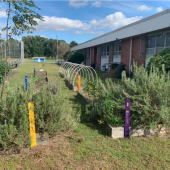
Abstract: This case study provides insights into a collaborative effort involving D.C. Virgo Preparatory Academy, a public university-run lab school in downtown Wilmington, North Carolina. The article overviews the combined efforts of DCVPA staff, university faculty, and community partners to engage the students in unique, hands-on learning experiences, particularly in the STEM areas. Students have taken the initiative to serve as change agents and leaders in the work. Several efforts at the school, including a composting program, a recycling effort, a seedling project, and a mycology lab, provide a window into dynamic experiential learning that has brought the university and school together.
Continue Reading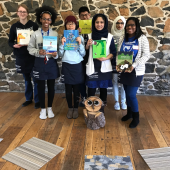
Abstract: A partnership between a university and local arboretum was expanded to include the campus library as a collaborator. Instead of having sustainability-themed programming between the two institutions focus on just the environmental components of the Sustainable Development Goals (SDGs), a library brings attention to literacy and information access across all aspects of the partnership. We share two public programs held between our university and an arboretum with strong involvement by the library in the development and execution stages, thereby increasing the connections across the SDGs and progress towards the 2030 agenda.
Continue Reading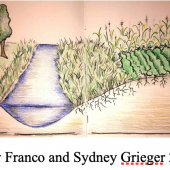
Abstract: This study examined how placemaking curricula shaped teacher candidate (candidate) knowledge, dispositions, and skills to understand, appreciate, and sustain local diversity, as evidenced through candidate reflections and products created in an elementary teacher education course integrating civic science concepts and practices into elementary classrooms. This study explored how placemaking curricula engaged community stakeholders in meaningful shared inquiry on real-world challenges, while meeting state science education standards. Placemaking inquiry projects developed by candidates focused on soil and water conservation, and sustaining diversity in schoolyard spaces. Curricula engaged candidates in learning soil and water conservation techniques from local farmers and conservation leaders, then developing and sharing co-authored civic science children’s books on conservation topics aligned to grade-level standards. As further placemaking curricula, candidates partnered with elementary teachers and students to guide schoolyard observations, designs, and models constructed to sustain diverse abilities, cultures, and ecologies. Presentations to parents and peers celebrated shared insights.
Continue ReadingAbstract: I was slow in coming to see the desperate need of sustainability education, in part because of a missed opportunity in my field of outdoor adventure education (OAE). Although a burgeoning set of scholars agree that OAE is strategically placed to educate for sustainability, little change within our discipline has occurred. To encourage the transition, this paper has four central aims. First, I contextualize the implications at stake by summarizing recent scientific predictions around climate change. Second, I differentiate sustainable OAE into the sustainability of OAE (e.g., its practices, footprint size, etc.) and OAE for sustainability (e.g., curricula that promotes education about sustainability), noting that despite long-standing petitions to address both, progress has been made in neither. Third, I celebrate, with others, the inherent potential that OAE has to promote sustainability through its educating in natural environs, within living/learning communities, which utilize physical/sensory, affective and intellectual ways of knowing that inspire critical impulses. Fourth, I outline the central changes that need to occur in order to create sustainable OAE. The foremost change needed is for OAE programs to curricularly commit to promoting a sustainability worldview, including values, knowledge, dispositions, and agency related to environmental, social, and economic justice. However, change of this depth will require a revision of OAE course offerings that allow for multiple and prolonged participant engagement over time. Such engagement, then, necessitates that OAE shift its emphasis from remote and sublime landscapes, to programs that not only connect participants to the places in which they reside, but cultivate a care and affection for them. This appreciation can be created through a combination of adventurous learning and microadventures. In sum, “local landscapes, far more often, as a way of life” encapsulate the changes OAE might make in contribution to the global need of sustainability.
Continue ReadingAbstract. This study investigates whether children at an urban place-based environmental education camp can develop three dimensions of eco-character development after week-long participation: Head (knowledge), Hand/Feet (action), and Heart (care/connection). Using a community-based and inquiry-driven curriculum, campers practiced the roles of an arborist, ecologist, and environmental steward. Fifty-five Campers were assessed on all three dimensions using a 10-question pre/post-survey. An overall increase in content knowledge, relationships with nature, and motivation for pro-environmental behaviors were found. Outdoor environmental education summer camps and other out of school experiences may be the new avenue for educators and instructors to consider when trying to promote positive eco-character development in future generations.
Continue Reading
Abstract: While passionate, project-based, and place-based education may sound like a stream of buzz-phrases or fads in education at face-value, this article uncovers their impact on student engagement and academic proficiency. While they are not textbook, traditional, pedagogical approaches, they are esteemed in the field of Education as undeniably effective and worth teachers’ consideration. This article discusses the impactful aspects of a.) passionate teaching, b.) project-based learning (PBL), and c.) place-based education (PBE). A former fifth-grade teacher’s experience in creating and implementing a curriculum titled, “Farm-to-Table,” contextualizes the power of passionate teaching, PBL, and PBE when used simultaneously. The article concludes with special considerations for other teachers that warrant attention before they start planning their own passionate, PBL, and PBE curriculum.
Continue ReadingLink to the Ecomedia Literacy Table of Contents Lopez et al. Editorial Overview JSE April 2020 Ecomedia Literacy PDF Forward from JSE Editor-in-Chief, Clare Hintz: The Journal of Sustainability Education marks its tenth anniversary year with an issue on Water Literacy (published in March) and this issue, Ecomedia Literacy. From a dream of several Ph.D. […]
Continue Reading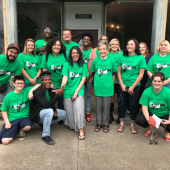
Abstract: In the summer of 2019, the We are All Connected urban-rural youth media program launched Something in Our Water, an eco-media documentary project that investigates the shared problem of water sustainability, public health, and climate change in their communities. This article discusses the transformative experience that the youth from New York City and the Clearfork Valley in the East Tennessee Appalachian mountains had as they learned about the history of multinational coal mine companies’ economic and environmental exploitation of the community, and the fierce and unequal power relations that continue to challenge environmental advocates today. With a focus on the perspectives of one of the Tennessee youth producers, the article reflects on the impact intergenerational learning and multicultural collaboration can have in nurturing future youth and community eco-media activists in Appalachia in the face of deeply rooted local and structural constraints. Through the process of documenting struggles in urban and rural communities, the youth team developed a deeper understanding of how the environmental justice movement cuts across differences to show how everyone is connected and can be empowered to take action.
Continue ReadingAmerica is falling behind the rest of the world in science and math. There is therefore, a renewed emphasis on STEM subjects (Science, Technology, Engineering, and Math). But while mastery of STEM subjects is essential to the functioning of society, we’ve neglected some other areas that are at least as important, if not more so. But without an equal commitment to comprehensive civics education — an examination of subjects that touch on the relationships between people, government, the economy, and media — all the technical know-how in the world will be for naught. The author suggests a renewed focus on MESH education, which stands for Media Literacy, Ethics, Sociology, and History. Because if these are not given equal attention, we could end up with incredibly bright and technically proficient people who lack all capacity for democratic citizenship.
Continue Reading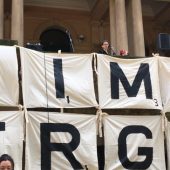
Transformative sustainable pedagogy and public intellectual work share the same aims and guideposts, including upholding higher education’s foundational intentions of fostering moral character in tomorrow’s leaders. Radical modes of sustainable education, including regenerative pedagogy, which tends to the global shift to restore, respect, and regenerate ecological and societal balance, and inside-out pedagogy, which helps learners take their inner seeds, sprouts, and blossoms of good ecocultural intentions to stages of external fruition, speak both to educating learners and engaging the public. If pedagogues aim to encourage students to put beliefs into action and be leading voices in ethically addressing today’s pressing environment and society problems, this may require role modeling by having the courage to do so themselves. In these contexts, the author relates her own experiences speaking for Extinction Rebellion as an illustration of expanding notions of what it means to be a sustainability educator today.
Continue ReadingThis editorial overview provides an introduction to this special Journal of Sustainability (JSE) issue devoted to water and climate change, which is being released during United Nations World Water Day 2020. The article contextualizes some of the water security risks that are exacerbated by climate change, such as increasing floods and droughts. This piece further provides a brief overview of the articles in the special water and climate issue of the JSE.
Continue Reading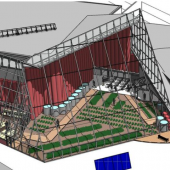
Abstract: The new educational revolution of Educating for Sustainability needs to be taught in a new, revolutionary teaching space; a teaching bioshelter. Drawing on the five ecological principles of the Center for Ecoliteracy, this new teaching space should reflect ecocentric design principles, rather than the previous anthropocentric industrial designs of our current school and college classrooms and campuses. A solar-powered, living classroom, a system of systems, such as a teaching bioshelter, opens new educational horizons by providing continuously available and hands-on learning environments not currently available to the Educating for Sustainability (EfS) curriculum. Fortunately, the architectural and technical design work for these kinds of spaces was pioneered nearly 50 years ago by numerous cutting-edge research groups, such as the New Alchemy Institute. It is suggested that these two ecological flows, of design and education, be joined to enhance and expand the mission of Educating for Sustainability.
Continue ReadingAs schools provide students with choice, support the development of critical thinking skills and promote project-based learning, incorporating a focus on sustainability is a natural progression of the learning process. In 2012, the US Department of Education (DoE) developed a federal outreach initiative entitled Green Ribbon Schools (GRS) that promotes sustainability, healthy living, and collaborative efforts. The catalyst behind this initiative was a group of non-profit organizations, including the Center for Green Schools at the U.S. Green Building Council (USGBC). This research focuses on case studies of K-6 schools that have been awarded the Green Ribbon School designation and how these schools build a foundation for adopting and continuing sustainable principles. Specific K-6 schools were identified and teachers and administrators from those schools were interviewed as to how they incorporated the three pillars of green ribbon schools (reducing environmental impact, improving health and wellness and offering effective environmental and sustainability education) into their existing curriculum and physical structure. Nine thematic categories were found to be the driving factors that supported the GRS success in their sustainable policies. The themes from this research help to articulate the conditions needed to create and advance sustainability initiatives.
Continue Reading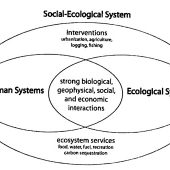
Breaking though to millennials in the classroom is becoming an important objective for all educators. These students demand more from their learning experiences and many traditional education techniques are often ineffective. One technique that holds potential is “Flip” education, a unique active learning approach. Although Flip is normally associated with the hard sciences, this paper presents a case study that demonstrates its effectiveness in the social sciences, specifically an upper division undergraduate environmental/sustainability planning class. Two important takeaways from this study include: 1) that teaching must be more student-centered, allowing students to take more control of their own education as assigned material be available before the fixed class time so as to allow class time for more active learning; and 2) Students report improved learning when Flip experiential methods are used in conjunction with some form of standard professor lectures.
Continue Reading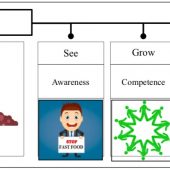
Abstract: The impact of school gardening on nutritional attitudes and behavior regarding purchase and consumption of food is explored with pupils who participated in school gardens. The researchers of the recent study conceptualized a framework of potential factors influencing nutritional behavior based on empirical data with pupils from general and vocational high schools in Vienna. Three hundred and sixteen pupils, aged between 16 to 21, were interviewed in a cross-sectional study. The pupils who participated in school gardening are significantly better informed about sustainability than the pupils who did not. There is a significant difference between pupils who took part in school gardening and those who did not, regarding their self-assessment towards their connection to nature and sustainability. The total consumption of vegetables has increased within the families of participating pupils by 17%. School gardening seems to promote pupils’ reflection on their own diet as well as foster a favorable attitude towards a healthy and sustainable diet. We conclude that the implementation of school gardening has a significant positive impact on pupils’ attitude and behavior towards sustainable diets.
Continue ReadingAbstract: Energy literacy, defined by the DOE, “is an understanding of nature and role of energy in the universe and in our lives” and, “…is also the ability to apply this understanding to answer questions and solve problems” (U.S. Department of Energy, 2013). Energy literacy is continuously evolving with the development of new feedstocks, technologies, and processes – all of which contribute to the changing landscape of energy production and use. In order for energy education to evolve with the energy field, better tools are needed to assess educational programs. The assessment discussed here is a step towards developing such an assessment for bioenergy.
Continue Reading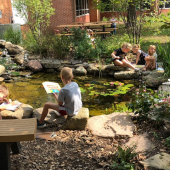
Though often considered an area of importance and emphasis, the enactment of Environmental Sustainability Education can vary considerably across schools and settings. This study used a narrative approach to tell the story of Environmental Sustainability Education at three schools within a 10-mile radius of our institution: a public charter school, a public school with a magnet STEM program, and a private Friends school. Our findings are discussed using the NAAEE’s Essential Underpinnings of Environmental Education, and shed light on possible future direction for pre- and in-service teacher education in Environmental Sustainability Education.
Continue Reading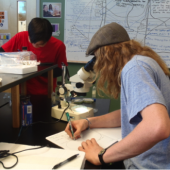
Abstract: This theoretical and conceptual article explores the connection between systems design in education, specifically curriculum design, and critical pedagogy, the educational adaptation of critical theory. The author presents the well-established concept of how the industrial standardization of education stems from the imposing of linear structures onto curricular design, inherently suppressing students and communities to have greater control on their educational experience. While there have been great gains in sustainability education, it is self-defeating to the systems thinking nature of sustainability to have sustainability instruction follow traditional linear formats. The author discusses some essential concepts to systems thinking and systems design, and then explores many of the preeminent authors of critical pedagogy and their respective viewpoints. In the discussion, the author interweaves how a systems approach to curriculum design can help meet calls made by critical pedagogy theorists, possibly alleviating some of the oppressive curricular norms assumed by industrialized linear education.
Continue Reading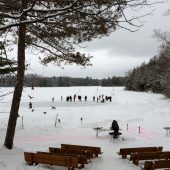
Abstract: In this article, we examine the collaborative efforts of university-employed folklorists with Waaswaaganing Anishinaabe (Lac du Flambeau Ojibwe) teachers and community leaders in what is currently known as northern Wisconsin. Focusing on the Ojibwe Winter Games—an annual weeklong event in February for middle school students that aims to revitalize traditional competitive games—we suggest that decolonizing sustainability education requires recognition that sustainability is pluralistic and culturally specific. Educators must facilitate a restorative systemic shift towards Indigenous sustainabilities through Indigenous-centered pedagogies and methods of knowledge production. In order to accomplish such a shift, our responsibility as academics and public folklorists must always be to the Indigenous communities with whom we work. We explore the role of non-Indigenous collaborators in Indigenous-led decolonization efforts, in developing educational systems that support and sustain Indigenous knowledge systems, and in the repatriation and rematriation of land, language, and culture.
Continue ReadingAbstract: Decolonization is a multifaceted and complex process, involving a wide range of concepts, including the restoration of Indigenous lands to Indigenous control, improved recognition of tribal sovereignty, strengthening of Indigenous worldviews and knowledge traditions, cultivating cultural responsiveness in education and health care, aligning research methods with Indigenous cultural priorities and values, and more.
This special issue of the Journal of Sustainability Education on the topic of Decolonization and Sustainability Education reflects many of these diverse projects. The issue is inclusive of Indigenous and allied voices, of academic and Indigenous discourses, of large-scale political actions and—what Jeff Corntassel calls—“everyday acts of resurgence.” The selections are arranged in ways that center Indigenous voices and the work on the ground that reinforces Indigenous sustainabilities and Indigenous-centered pedagogies.
Continue ReadingAbstract: Since the 1990s research has been telling us that indigenous students do better in school when they are connected to their cultures. Our experience affirms studies concluding that students who have strong connections to their culture are more resilient and have a stronger sense of efficacy.
Continue Reading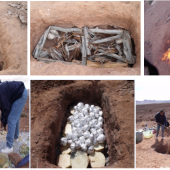
Abstract: For millennia, education for the Hualapai Tribal people was learned through intergenerational lessons taught with the family. This provided younger generations with the skills and knowledge needed to thrive in harsh desert environments. Over the past centuries tribal education has undergone numerous transitions. For the past twelve years the Hualapai Ethnobotany Youth Project has implemented an intergenerational learning program with the elders and youth of the tribal community to instill the centuries old knowledge that could only have been obtained through generations of experience. The program looks to new ways in modern times to teach the old ways in maintaining the continuity of knowledge that only the grandparents can remember.
Continue Reading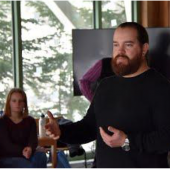
Ojibwe education is used at Conserve School, an environmental semester school, to help high school students better understand diverse perspectives on stewardship and to explore the history, cultures and place of the Northwoods of Wisconsin. In the Environmental Stewardship class, students learn about indigenous history, culture and environmental perspectives from a local Ojibwe forester. The students use this perspective to help them appreciate their place at Conserve School and explore their own environmental ethics. Students also participate in Ojibwe seasonal celebrations to better comprehend how place and people are interrelated.
Continue Reading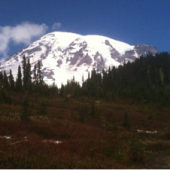
Abstract: In this article, we discuss the importance of Indigenous traditional ecological knowledge as the foundation of sustainability education, and we describe the need for, and successful efforts to, begin building an Indigenous Traditional Ecological Knowledge initiative at a research university. We share the guiding theoretical framework of our work, and the three goals of the initiative. We note the tensions involved in crafting a vision statement that a diverse group of faculty, staff, and students can all uphold in our collective work. We conclude with a description of our next planned steps for the initiative, and our hopes that this work will help decolonize sustainability education.
Continue Reading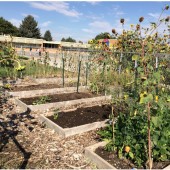
This essay describes a project in which a 4th grade class joined forces with a university class to study and produce as theatre Paul Fleischman’s Seedfolks, an inspiring story of a diverse group of community residents who transform a vacant urban lot into a wonderful community garden. In addition to the arts component, the two teachers unexpectedly found an opportunity to encourage sustainability of education when their students embarked on a pen pal correspondence.
Continue Reading
The purpose of this policy study is to provide to educators and curriculum writers a critical account of the diversity and contestability of the conceptions of sustainability embedded into the policies and processes related to the transformation of K-12 curriculum in British Columbia (B.C.), Canada. First, we examine the different conceptions of sustainability within the context of distinctive socio-cultural paradigms: the industrial, the existentialist, and the symbio-synergetic. Second, we address the following key questions: in what socio-cultural paradigm is the dominant conception of sustainability grounded in new K-12 curriculum policy in B.C. and in which ways does that paradigm question the dominant industrial notion of modernity and development?
Continue ReadingAbstract: The concept of a Green School is contested, negotiable, and complex, and this study considers stakeholders’ perspectives of this concept. A total of 21 stakeholders (principals, teachers, and parents) from three award-winning green preschools in three different societies were interviewed to discern their understanding of the notion of “green school”. The award-winning green schools were located in Bali (a developing region in Indonesia, a developing Eastern country), in Berkeley (a developed city in the United States, a developed Western country), and in Hong Kong (a developed city in a China, that that acts as a meeting point of East and West). They were selected as they are considered to be the pioneers in this field in their respected regions. Semi-structured interviews were conducted with principals, teachers, and parents at the sites over a 10-month-period. Three concepts related to the Green School, namely Green Education, Green School, and Green Building, were explored. The stakeholders were asked about their preferences in relation to having children educated inside a Green Building or receiving education utilizing a Green Curriculum. Results indicated that stakeholders’ perceptions about the Green School concept were inconsistent. However, they were aligned with the ‘green’ message that each school tries to convey. Stakeholders, regardless of their cultures, agreed consistently that they preferred preschools implement a Green Curriculum over occupying a Green Building. Implications and future directions for research on Green Schools are discussed.
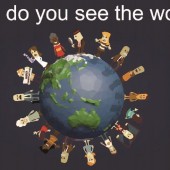
Abstract: Latest results in Education for Sustainable Development (ESD) research and practice show a tendency towards more holistic approaches aiming at deep transformation of the self and the meanings of human existence. Aligned with this, we present the Transdisciplinary Framework of Worldviews and Behaviours (TFWB) to describe the possible formation and expression of a worldview, a complex constellation of meaning and identity from which all human conduct emerges. Four key principles arising from the TFWB are: 1) The whole embodied nervous system is greater than the sum of its separated parts, especially when it comes to intelligence (information processing) and learning (meaning making); 2) The mind is a highly emotion-dependent and mostly unconscious entity; 3) A worldview is a unique arrangement of meaning each person builds, and lives through; and 4) Increasing self-awareness about how a personal worldview is formed and expressed generates increasing opportunities for that individual to explore and build a different meaning for their experience, or to explore and choose different forms to express it (behave). The TFWB informs a new perspective on learning that could be useful for the achievement of ESD’s transformative goals, guiding the innovative design of educational initiatives encouraging new conceptualizations about the meanings of being human; thus, facilitating potential behavioural transformations toward a more sustainable existence.
Continue Reading
Abstract: Scientific literacy through critical-thinking and problem-solving is an important part of the future of our nation. Understanding of science and engineering concepts creates informed citizens who can contribute to democratic conversations and be knowledge consumers. Scientific literacy also requires an understanding of data and data analysis. This lesson uses Global Climate Change as a platform for understanding graphical data by exploring the manipulations of graphs and helping students recognize the ways in which perspective and scale play a role in graphing data. The lesson provided is designed to be covered in 90 minutes with high school students. Using four graphs of global temperature change, students will work in groups to analyze graphs and recognize the way in which scaling can play an integral role in the perception of information as well as an understanding of the degree of temperature change over periods of time due to global climate change.
Continue Reading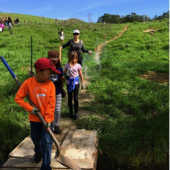
Future casting for us begins with going back — to the real basics, to understanding our place and the people who sustained themselves here for hundreds of years, engaging in real-world problem solving in pursuit of “the right kind of change at the right time.”
Continue Reading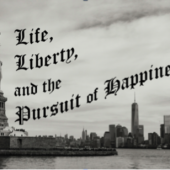
Life, Liberty and the Pursuit of Happiness: Reframing our Goals for Education
Continue Reading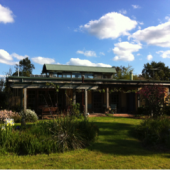
Wheeler JSE March 2017_Future Casting Issue PDF Abstract: Theories of sustainable architecture that address sexual difference are rare in an architectural context, whether in the United States or Europe, and this paper proposes a critical perspective on architectural design using sustainable schools as an example and adopting the question of sexual difference. Informed by the […]
Continue Reading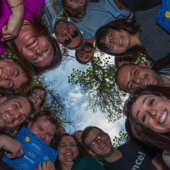
Abstract: In order to effectively address global sustainability challenges, a wide spectrum of society must be engaged. Universities generate knowledge, enhance understanding of sustainability problems and identify potential pathways to solutions. However, the information they produce often does not reach the public sector. Primary and secondary schools contain expert teachers and science communicators, but they are often limited by educational standards and other teaching duties. On the other hand, museums, such as science and natural history museums, are particularly skilled at translating scientific information so that it engages and excites the general public without the limiting expectations of school systems. Thus, partnerships between museums and universities offer great potential for disseminating sustainability knowledge and solutions on a global scale. However, given the complexity of sustainability problems, partnerships between universities and museums require a deep level of collaboration beyond the scope of information or resource exchange. In this article, we explore our experiences collaborating with museums, reflecting on challenges and, ultimately, identifying four main focal areas to successful, transformational collaborations. Though we focus on museum partnerships from the university perspective, we contend that any institution can apply these four steps to make progress on wicked problems that require immediate action.
Continue Reading
Abstract: The study was a descriptive and correlational quantitative study of U. S. Department of Education Green Ribbon Schools (ED-GRS) teachers’ perceptions of ecological and democratic principles in their schools. Descriptive statistics described the ED-GRS teachers’ perceptions of how the ecological and democratic principles operate in their schools. Correlations were used to look deeper at the ecological and democratic principles and to what extent these principles were related. Teachers in ED-GRS award winning schools reported evidence of ecological and democratic principles. The findings suggested that ecological and democratic principles had a positive relationship among them. In addition, there were seven principles that had strong, positive relationships among each other as perceived by teachers in ED-GRS award winning schools. I concluded from the data that sustaining ecological change requires evidence of democratic leadership and community. This study contributes to the field of educational leadership by providing a descriptive analysis of a newly-created United States Department of Education award. In addition, this study provides schools and school leaders with information as how to make sustainable changes that lead to healthy, high performance schools including a theoretical framework to provide guidance in making the sustainable changes.
Continue Reading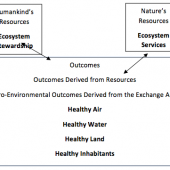
Abstract: In this paper we compare and contrast the Theory of Planned Behavior (Ajzen, 1985) with Social Exchange Theory (Homans, 1958) as conceptual foundations for eliciting pro-environmental behavior. We reason that Social Exchange Theory provides the better orientation because of its metaphorical power in casting humankind as being in a reciprocal relationship with nature rather than being in a superior position over nature. We illustrate our thinking by discussing ecosystem services (Melillo & Sala, 2008) as nature’s contribution to humankind in return for humankind’s responsible environmental stewardship.
Continue ReadingAbstract
The study assesses the extent to which curriculum of secondary schools in Tanzania addresses sustainable education through integration of environmental education. Specifically, it evaluates the subjects used to deliver environmental education in secondary school. Also the study found out perceptions, challenges, and recommendations for implementing environmental education. This research adopted a case study, qualitative approach to study the subject matter in its natural settings while making sense of the contents of the subjects and perceptions of stakeholders. Cross sectional, stratified sampling involved both students from all classes, experienced teachers in geography and biology and a head teacher as well. It was found that most environmental education competencies are delivered mainly through the geography subject, and some in biology using an integrated teaching approach. Students and teachers were fairly knowledgeable and had understanding of basic environmental issues. Main challenges facing implementation of environmental education included an integrated learning approach, inadequate knowledge on environmental education, lack of support from each other and from school administration, and cultural myths and beliefs.
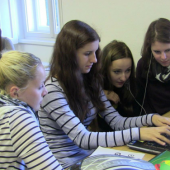
Abstract: The aim of this case study was to develop, apply and evaluate a science-education workshop format to communicate climate change to young people. Based on current theory in climate change communication and Education for Sustainable Development, the workshop has been applied in different contexts with more than 300 children and teenagers. A specification of the consecutive steps should help practitioners to use the workshop in their contexts. While results of the application of the workshop should give an insight into what can be expected from the workshop, an impact assessment of the participants who took place in the workshop outlines the effects it has on students. This paper does not only provide hands-on advice on how theoretical climate change communication knowledge can be translated into action, it also outlines the impacts of the described workshop.
Continue ReadingAbstract: This thought piece proposes the adoption of a new “3 Rs” to inform a climate-responsive environmental and sustainability education (CRESE): reclamation, resilience, and regeneration. As a changing climate becomes the larger campus of our learning, denial and top-down emergency preparedness both prove to be insufficient. We are invited into a deeper approach. Reclamation and resilience fold in (1) the saving of enduring biocultural lifeways and patterns and (2) the dynamic flux-states of panarchic socioecological resilience models. These two partner with (3) regeneration: context-responsive social collaborations; eco-socially-embedded capacity building systems; and the promise of regenerative design. These three approaches allow us to re-envision educational systems and encounters that are proactive rather than only reactive or responsive in metabolizing persistent climatic volatility. These three approaches – reclamation, resilience, and regeneration – echo the three approaches to climate change that Pelling has suggested (2009) – mitigation, adaptation, and transformation. Note, however, unlike Pelling’s model, these approaches are conceived as simultaneously requisite literacies and movements rather than as competing. Reclamation, resilience, and regeneration represent ever-more-complex types of capacities and support capacity building aimed together toward life-supportive, dynamic, complex systems transformations. Environmental and sustainability education that fosters skills of reclamation includes preservation, conservation, recording, and the establishment of libraries and sanctuaries of exemplar systems. Environmental and sustainability education (ESE) for resilience includes network extension and adaptive capacity building. ESE for regeneration nurtures emergent complex systems metacognitions, creativities, and transformative, transgressive social approaches that are connective, disruptive, and innovative and model and embody complex emergence. Regenerative ESE fosters skills to facilitate catalysis of emergent regeneration, self-organization, and transformation into more complex living systems. All of these position embedded learners in pro-active, systems-intensive embodiments of the types of living networks that foster survival, flexibility, thriving, and phase-change during our entry into a time of consistent climate turbulence.
Continue Reading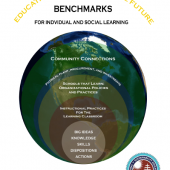
This document is a provisional draft that has emerged out of an initial “State of the Field” issue and database, published in JSE in 2014 and a follow-up conference in Winter of 2015.
Jaimie Cloud of the Cloud Institute has been the lead organizer and author of this document. See the opening pages for the large number of additional contributors.
A process for comment and revision will be announced during Spring/summer 2016.
Continue Reading
Just as place scholarship reaches across and through many disciplines, so this issue ranges widely, including 14 scholarly features as well as media reviews, case studies, photo and poetic essays, and sustainability journeys. Disciplinary lenses include the arts, sociology, philosophy, natural resource management, sports science, and archaeology, among others.
Continue Reading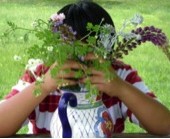
Abstract: Moving beyond the despair resulting from what appears to be a tipping point of life systems due to climate change, this narrative presents a possibility for regenerative hope. The article begins by discussing an emergent typology of hope that includes hokey hope, resolute hope, mythical hope, patient hope, hope deferred, sound hope, authentic hope, critical hope, and transformative hope. Drawing upon this typology, a model for regenerative hope is developed with the following features: care and conviviality, experience and engagement, imagination and joy, risk-taking and belief in possibilities, and critical sensibilities and transformation. Series of photos and voices of youth from a low-income middle school actively engaged in the learning gardens are presented as practical examples of pedagogy of action and agency manifested as regenerative hope.
Continue Reading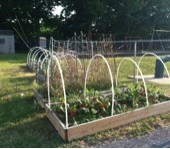
Abstract: Opportunities abound for educators to rethink the way teaching and learning occurs for today’s students. Taking time to focus on learning outdoors, on making healthy choices, and on fostering a sustainable learning and living environment is transforming the way schools work across the nation. Through the lens of the three pillars of the U.S. Department of Education Green Ribbon Schools (ED-GRS), this article described examples from a range of school sites and includes the voices of administrators, teachers, and staff in revisiting how we teach, learn, and lead. Helpful tips regarding school sustainability round out the article to provide “next steps” for the reader.
Continue Reading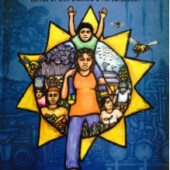
Abstract: The anthropocene era is one that is rife with ecological and social crises. Although many have been aware of the enormity of these problems and their systemic roots, the widespread educational response has not been sufficient in preparing youth to take part in creating a more just and sustainable world. Climate change is an umbrella issue for much of what the worlds facing. It is time for teachers to take the lead in using the classroom as a place to bring relevant, critical, joyful education that will lead to action in this crucial time. The following article is a book review for A People’s Curriculum for the Earth, a powerful resource for helping teachers equip students to confront our interconnected global crises, especially the climate crisis, and to highlight stories of teachers, activists, and organizations working to make a difference.
Continue Reading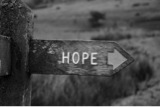
Abstract: The concept of hope is rich in context, and working with it from different angles can enhance inner resources. Framing hope as a process offers tools for sustainability educators: subjective exploration, empathy development, critical thinking, and civic engagement.
Continue Reading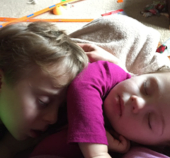
This is a gratitude song created with children’s bedtimes in mind.
Continue Reading